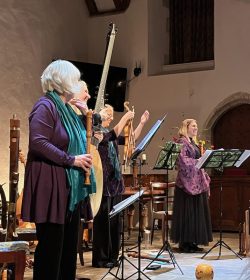 PATRONS. poets, pupils, printers, performers, publishers … pirates! The roll call of women who contributed to the development and distribution of music from the Renaissance through to the Enlightenment is nothing if not surprising!
PATRONS. poets, pupils, printers, performers, publishers … pirates! The roll call of women who contributed to the development and distribution of music from the Renaissance through to the Enlightenment is nothing if not surprising!
The multi-instrumental female quartet Sounds Historical came to the Medieval Hall in Salisbury Cathedral Close on the opening night of the new Salisbury Musick baroque festival and delighted a capacity audience with a programme, More Than A Woman, which explored the contribution and legacy of women in music from the 15th to 18th centuries.
Their subjects ranged from grand aristocrats – Isabella d’Este of the glittering Gonzaga court at Mantua, the Countess of Bedford; to the tragic – Anne Boleyn; to the deliciously bad Grace O’Malley, a legendary Irish woman pirate.
The audience was entertained with music that was often poignant – O death, rock me asleep, attributed to Anne Boleyn on the eve of her execution; sometimes joyful and dancing – dances presented by Lucy Russell, for masques at the court of King James I; or rescued for posterity – scores and songs written out by calligrapher and scribe Jane Pickeringe in the early 17th century.
The four musicians all played a wide range of early instruments – Lynda Sayce played the viol, recorders, and lutes of different sizes and several periods, Alison Kinder played viols and recorders, Heidi Fardell played flutes and recorders, and Mary Tyers, the only one of the group from the north of England, played flutes and recorders and sang. Mary is also a folk singer.
The theme of the evening was a celebration of the unseen and largely unrecorded contribution of women to the development of music in Western Europe – a scene that has until recently been completely dominated by men.
What made the concert so enjoyable was not only the quality of the music and the sounds of the different instruments, but the informative introductions. So we learned just how important Isabella d’Este was as a patron of composers and music, how colourful the court of James I was because of Lucy Russell’s theatrical impresario gifts, and how skilled musicians such as Mlle Taillart, the first woman to perform in the Concerts Spirituels in mid-18th century Paris.
But perhaps for many, the most memorable of these extraordinary women was the pirate, Grace O’Malley, who petitioned a not unsympathetic Queen Elizabeth I for a stipend, as it was so hard for women to make a living in Ireland. Grace’s story was told in a ballad, Granuaile, “the Queen of the ocean”, sung by Mary Tyers, with the audience joining in the chorus.
FC